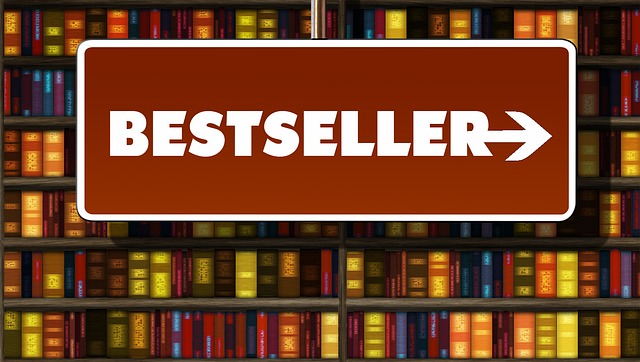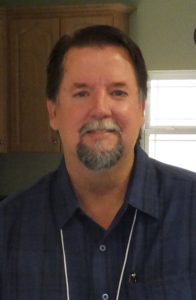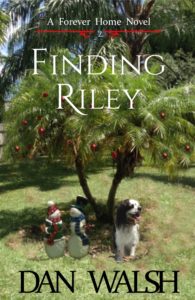Can you share a little about your recent book –It’s called, Finding Riley, and just released on October 1. It’s the second book in an inspirational series that includes a shelter dog as a main character. Of course, there are plenty of humans in the story and even a nice romantic thread. The first book, Rescuing Finley, came out 11 months ago and is doing very well in both sales and reviews (276 Amazon reviews, Avg 4.8 stars).
This is kind of my bread-and-butter genre (Nicholas Sparks-type books). Thirteen of my 17 novels are in this genre. I also have 2 stand-alone suspense novels, and last year I began the Jack Turner suspense series. It has really taken off. I’m researching the third book in that series now and hope to start writing it on November 1. It will release in the spring.
Why do you write? Do you have a theme, message, or goal for your books? In a sense, I write because I have to. Like a lot of writers, I feel something of an inner compulsion to do this. But I also love writing. I’ve had the good fortune of being totally unfamiliar with “writer’s block.” Since I began writing novels in 2007, the story ideas just keep coming. As for a theme or goal, I write character-driven novels, both contemporary and historical. Several of my books are love stories and family-life dramas…But I also love to write suspense novels. Even when writing inspirational books, I want to keep the pages turning. My goal, whether writing contemporary or historical, inspirational or suspense, is for my readers to feel satisfied and thoroughly entertained. In short, to feel a strong inner compulsion to go right out and pick up another one of my books.
How long have you been writing? And how long did it take you to get your first major book contract? I began writing novels in earnest during the summer of 2007. After finishing and polishing up that manuscript, a Christmas novel called The Unfinished Gift, I made a list of A-List literary agents to submit a package to (query letter, synopsis and first 50 pages). I sent it off to the first 3 agents on the list. Two of them loved what I sent and got back with me quickly, asking to read the whole book. I signed with one of them a week later. She had a contract with a major publisher two months after that. Things kind of took off pretty quickly after that. I used to hate answering this question, because other writers would tend to hate me since their experience was so much harder.
How long does it take you to write a book? I’ve been writing full-time now since 2010. On average, it takes me about 4-5 months. I was still working full-time during the publishing process for my first 3 novels. Back then, it took more like 9-10 months per book.
What’s your writing work schedule like? I write at least 5 days a week. I do all of my non-creative writing tasks in the morning (social media, marketing, etc.). Then after a short lunch break, I shift gears and work on my current novel for the rest of the afternoon. My goal is to write one keeper-chapter per day.
Do you have an interesting writing quirk? If so, what is it? I’m not sure if this qualifies as a quirk, but I don’t actually “write” my books any longer. About 3 years ago, I suffered some significant nerve damage in my forearms and hands, mainly from writing so many novels with poor posture. Since then, I’ve had to use a voice recognition program to write my books (used it for the last 6). I’m using it now to answer these questions. It works very well. I only have to use my hands to correct the 2-3 percent of words it gets wrong.
What has been your greatest joy(s) in your writing career?
- When a top-shelf literary agent from New York said yes she would represent me.
- When I signed that first book contract and cashed my first advance check.
- When I held my first published novel in my hands, and then saw this book on the store shelves for the first time.
- When I won my first 2 writing awards from a national Fiction Writing organization (for debut novel and also in my genre category).
- When I signed a multi-book contract worth 6 figures.
- When, after leaving my traditional publisher, my first indie novel (When Night Comes) came out and began selling just as well as my traditionally published books. It was my first true suspense novel and signaled a new season in my writing (allowed me to write both types of novels from now on, inspirational and suspense).
What has been your darkest moment(s)? During the first 6 months of 2015. It was the first time I was writing without a contract and a generous advance. I wasn’t sure I’d be able to continue writing full-time.
Which of your books is your favorite? Very hard to pick 1 when you have 17 out. Each of them involved a major investment of time and energy. But I suppose I could pick 3:
- The Unfinished Gift (because it was my first and launched my writing career).
- The Reunion (probably my highest-reviewed book on Amazon and the first one to be adapted for a movie).
- When Night Comes (because it was my first indie suspense novel and open the door for me to write more books like this.
Who is your favorite author to read? Probably the suspense writing duo of Douglas Preston and Lincoln Child (the Pendergast series).
What advice can you give aspiring writers that you wished you had gotten, or that you wished you would have listened too? I don’t mind sharing this, but it actually is advice I took to heart from the very beginning. It comes from a quote by the late NT Times best-selling author, Elmore Leonard. He said, “In your writing, try to leave out the parts readers skip.” That became a guideline for my writing. I want the pages to keep turning for my readers; for them to have the hardest time putting my books down. In some measure, I have succeeded in this. My novels have received over 4,000 reviews on Amazon (avg 4.6 Stars) and this is the #1 remark readers make about my books (even with the inspirational ones).
How many times in your career have you experienced rejection? How did they shape you? I only have one rejection letter, which I received at the very beginning. Since then, things have been going relatively well for me in this regard. The only other type of rejection I’ve received is when my publisher turned down some of the book ideas I pitched to them, because they were too suspenseful and not “in my brand.” Now that I’m an indie, I have proved them wrong. I’ve begun to write those books they rejected, and they are doing very well.
Do you have a favorite character or scene in one of your books? As I read this question, 17 different characters come to mind and too many scenes to pick out a favorite (one that stands above the rest).
Where do you get your ideas? I’ve been asked this many times before. It’s a hard question to answer, because the stories have come from so many different directions. But it’s fair to say, I’m always on the lookout for new story ideas. Whenever one comes to me, from whatever direction it comes, I usually sit down and write it out so I don’t forget it. I keep a folder for future book ideas.
What are common mistakes you see aspiring writer’s make? The biggest mistake I see is spending way too much time on things like marketing and social media. These things matter, but writing a great book matters 10 times more.
Where/How do you recommend writers try to break into the market? Unfortunately, following the path I took has become an increasingly narrow path in the last few years. The traditional publishing world is in a major upheaval, which has dramatically reduced the total number of slots publishers have available for accepting new authors. At the same time, taking the indie route has never been more promising. I’ve become friends with a good number of now-successful indie authors whose books were constantly being rejected by traditional publishers. They are making more now than I ever did during my traditionally-published years. Of course, the one central theme to their success is that they’re great writers writing novels and readers can’t stop reading their books once they start.
Dan Walsh is the bestselling author of 17 novels including The Unfinished Gift, The Discovery and When Night Comes. He has won 3 Carol Awards (finalist 6 times), 3 Selah Awards and 3 of his books have been finalists for RT Review’s Inspirational Book of the Year. A member of American Christian Fiction Writers (ACFW) and Word Weavers International, Dan writes fulltime in the Daytona Beach area. He and his wife Cindi have been married 40 years. You can find out more about his books or follow him on Facebook, Twitter, Goodreads or Pinterest from his website at http://www.danwalshbooks.com.
Finding Riley – Available Now!
Rescuing Finley – 254 Amazon Reviews, 4.8 Star Avg.
Remembering Dresden – Already 168 Reviews, 4.7 Star Avg.
When Night Comes – 383 Amazon Reviews, 4.5 Star Avg.








No Comments